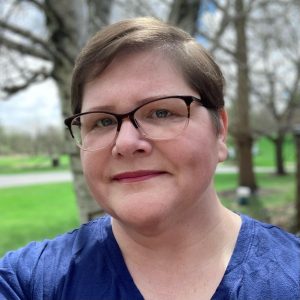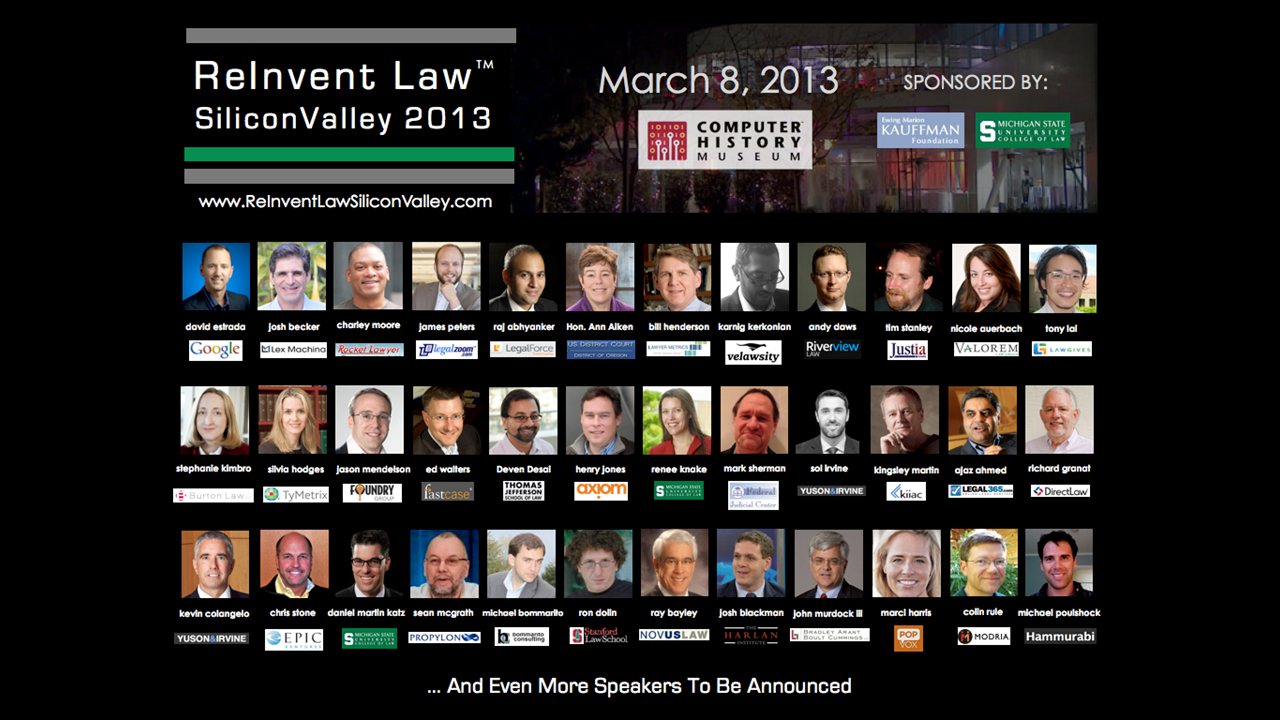As discussed in yesterday’s part one, this post is the second in a three-part series of reflections on the ReInvent Law Silicon Valley event, held in Mountain View Calif., on March 8, 2013, and what it meant to the authors and to the broader movement for innovation in law. Today, we feature contributions from Chas Rampenthal, Chase Hertel, and Sarah Glassmeyer.
– Dan Lear and Bob Ambrogi, series editors.
Chas Rampenthal, Chief Legal Officer, Dinari
 Chas is a founder and the chief legal officer of Dinari, a smart contract start-up. From 2003 to 2021, Chas served as LegalZoom’s general counsel and head of industry relations. Chas is an outspoken advocate of transformation in the legal industry, inspiring increased access to legal services through technology and new business models. Chas is a member of the California and Massachusetts bars and is qualified as a solicitor in the UK. Chas earned his bachelor’s degree in economics and math studies summa cum laude from Southern Illinois University and his JD from the University of Southern California. Prior to his legal career, Chas served honorably in the United States Navy as an officer and naval aviator.
Chas is a founder and the chief legal officer of Dinari, a smart contract start-up. From 2003 to 2021, Chas served as LegalZoom’s general counsel and head of industry relations. Chas is an outspoken advocate of transformation in the legal industry, inspiring increased access to legal services through technology and new business models. Chas is a member of the California and Massachusetts bars and is qualified as a solicitor in the UK. Chas earned his bachelor’s degree in economics and math studies summa cum laude from Southern Illinois University and his JD from the University of Southern California. Prior to his legal career, Chas served honorably in the United States Navy as an officer and naval aviator.
The year 2013 seems like both a minute and a lifetime ago. So much has happened in the past 10 years! I specifically remember Reinvent Law and the impact it had on the profession and my own view of legal services. At that time, I was in my tenth year as LegalZoom’s GC, dealing with the brunt of several attorney and state bar challenges. It was right around the time that the Legal Services Act went into effect in the UK, and I could not shake the feeling that our profession should (or maybe…would…eventually?) innovate and allow a business model that could provide legal services to the underserved. To do this, we would need to “Reinvent” a new method of delivery. It seemed like the right time to dive into the ways that added investment and people could take our profession forward.
Eddie Hartman, James Peters and I used to talk about how retail stores like Target were serving a massive middle-class product need and doing a phenomenal job growing a brand and satisfying their customers. My talk on Retail Lessons for the Legal Industry practically wrote itself!
One thing I will never forget is showing up that morning and asking the organizers where the lectern would be set up. To my horror, I was informed — just a few hours before my 15-minute talk — that it was a “no notes” presentation. I crammed/memorized like I was 19 with a chemistry final the next morning!
Looking back on the 10 years that followed, it was not long after that the “UPL Wars” were a thing of the past. LegalZoom received an ABS license in the UK, and eventually in Arizona as well! I am proud of the accomplishments of my fellow Zoomers that made a good deal of the TargetLaw presentation a reality — and even better than I could have imagined!
Reinvent Law was there when we were all thinking, “Could we?” A decade later we have a definitive and AFFIRMATIVE answer. I cannot wait to see what the next 10 years has in store. To all the dreamers that are out there: Don’t let the naysayers stop you from making new legal service delivery models a reality. There is still a lot of work to do
I want to thank Dan, Renee, and Michael for their vision, and for providing a forum that allowed all of us dreamers to gather and support each other!
Chase Hertel, Director & Counsel, SimpleCitizen
 Chase Hertel is the director and counsel for SimpleCitizen, an immigration-focused legal technology company. Prior to this role, he was a principal on LegalZoom’s Attorney Services team. Chase was also previously the deputy director and counsel of the American Bar Association Center for Innovation and has held other roles with high-growth legal tech companies focused on improving the delivery of legal services. Passionate about scaling access to justice, Chase is dedicated to empowering lawyers and clients to work together through technology. Chase is a member of the Legal Services Corporation’s Emerging Leaders Council and the Maryland Bar.
Chase Hertel is the director and counsel for SimpleCitizen, an immigration-focused legal technology company. Prior to this role, he was a principal on LegalZoom’s Attorney Services team. Chase was also previously the deputy director and counsel of the American Bar Association Center for Innovation and has held other roles with high-growth legal tech companies focused on improving the delivery of legal services. Passionate about scaling access to justice, Chase is dedicated to empowering lawyers and clients to work together through technology. Chase is a member of the Legal Services Corporation’s Emerging Leaders Council and the Maryland Bar.
My ReInvent Law Silicon Valley experience is one I will never forget. In March 2013, I had just completed Dan Katz and Renee Knake Jefferson’s Entrepreneurial Lawyering course as a 2L at Michigan State University College of Law. The class culminated in a start-up pitch competition in which my project partner and I pitched an immigration technology business designed to make the U.S. immigration process more accessible and affordable (an idea and opportunity I have refused to abandon and spoke about at ReInvent Law NYC in 2014). My project partner and I ended up winning that law school pitch competition and used our modest winnings to purchase airfare to the conference. I wasn’t exactly sure what to expect but knew some 3Ls that I looked up to in the program were going. Little did I know then that I would forge professional relationships that would stick with me to this day.
After spending the night on an air mattress at my uncle’s house in Cupertino (I could barely afford a coffee, let alone a hotel room), I showed up at the Computer History Museum bright and early. The place was packed and Dan and Renee almost immediately put me to work helping check in speakers and getting them mic’d up. I can’t thank them enough for that opportunity. As a shy first-generation college and law student who had never done any sort of networking in a crowd like this one, I found myself forced to interact with attendees and speakers. I did my best to stay on top of the tasks I was assigned while trying to awkwardly network with anyone I could.
Then Ed Walters took the stage. His talk, centered around who “owned” the law, opened my eyes to the deeply disturbing ongoing attempt by legal publishers to copyright the law, and I distinctly remember having to stop myself from giving him a one-man slow clap standing ovation. But my excitement didn’t stop there. Chas Rampenthal’s talk on how LegalZoom was (and still is) delivering legal services at scale via new business models helped put me on my path — one that led me not only to a role with LegalZoom helping to form its ABS law firm in Arizona but also to opportunities that bridge the justice gap for consumers while creating new revenue streams for lawyers.
I consider myself fortunate to have been part of ReInvent Law and deeply appreciate the friendships and professional relationships I can trace back to that day almost 10 years ago. Dan, Renee, Michael and the ReInvent Law crew: Thank you for showing me and the rest of the profession what a community of like-minded, dedicated people can do when they come together. I cannot wait to pay this experience forward.
Sarah Glassmeyer, Internet Raconteur and Bon Vivant
 Sarah Glassmeyer is a librarian and lawyer by training, and has spent her career in a variety of positions and organizations. She is passionate about open technology, content, standards and the power of community to effect positive change in the legal world and beyond. She catalogs all of this at sarahglassmeyer.com.
Sarah Glassmeyer is a librarian and lawyer by training, and has spent her career in a variety of positions and organizations. She is passionate about open technology, content, standards and the power of community to effect positive change in the legal world and beyond. She catalogs all of this at sarahglassmeyer.com.
When I look back at my weird life and career, which fortunately or unfortunately I have documented on social media and blogs for over 15 years, I can definitely see that 2013 was a dividing line between career stages. The work of Renee Knake Jefferson, Dan Katz, and the team at ReInvent Law had a major hand in helping me through the transition.
Prior to 2013, I was a librarian who recently changed work environments from law schools to the Center for Computer Assisted Legal Instruction (CALI). I was primarily interested in issues around open law and technology (and these, along with standards, are still a passion of mine) but CALI’s work with A2J Author led me to learn more about technology used by practicing attorneys and all the various opportunities for improvement in the practice world. When ReInvent Law Silicon Valley happened, I was on medical leave two weeks out from major surgery, but I was able to follow along on Twitter. Through the years I was able to attend the Reinvent Law NYC in 2014 and several events hosted in the Chicago area, though I still mainly engaged with the content and other viewers via Twitter.
(Talking to people face to face? No thanks! I’ll be the weirdo in the corner staring at my phone if you don’t mind.)
Even though I was focused on a very niche area of legal technology and innovation, I was able to see the interconnectedness of ideas and solutions. It also made me want to focus on systematic changes (like taxonomies, standardized deployments, data standards, and dare I say it, regulatory reform) instead of a specific subject matter solution.
(But more power to people that want to do that! Build a better mousetrap CLM!)
My exposure to the ReInvent Law world resulted in three main takeaways:
- There’s a cohort of people that will reflexively say “no” and shit on any idea from people who want things to be better. Ignore them.
- There’s a cohort of people that immediately jump on any bandwagon and think it will change the world if only people will stop being negative. You can also ignore them.
- There’s a group of people that are interested in making things better in big and small ways and you will see them again and again in your career because even though law is an international billion dollar enterprise, the number of people working towards change is somewhat depressingly small. However, it is a mighty group and growing daily.
Despite the fact that we work for competing firms, or companies, or are neutrals in non-profits or other organizations, I see a strong community and commitment to learning from each other and finding broadly compatible solutions. The open learning and sharing created at ReInvent Law had a large part in shaping that.
Watch for the final installment in this series tomorrow on LawSites.
 Robert Ambrogi Blog
Robert Ambrogi Blog